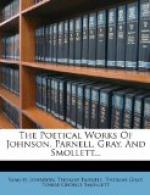In 1758 Gray left Peterhouse, owing to some real or imaginary offence, and removed to Pembroke Hall, where he was surrounded by his old and intimate friends. The next year he carried his two Odes to London, as carefully as if they had been two Epics. Walpole says that he “snatched them out of Dodsley’s hands, and made them ’the first-fruits of his own press at Strawberry Hill,’ where a thousand copies were printed. When published, they attracted much attention, but did not gain universal applause. Obscurity was the principal charge brought against them. Their friends, however, including Warburton, Hurd, Mason, and Garrick, were vehement in their admiration, and loud in their encomiums. In this year Colley Cibber, the laureate, died, and the office was offered to Gray, with the peculiar and highly honourable condition, that he was to hold it as a sinecure. The poet, however, refused, on the ground, as he tells Mason, that the office had ‘hitherto humbled its possessor.’”
In 1758, he composed, for his amusement, a “Catalogue of the Antiquities, Houses, &c., in England and Wales,” which was, after his death, printed and distributed by Mason among his friends.
The next year the British Museum was opened (15th January 1759), and Gray went to London to read and transcribe the MSS. collected there from the Harleian and Cottoman libraries. During his residence in the capital, appeared two odes to “Obscurity” and “Oblivion,” in ridicule of his lyrics, from the pens of Colman and Lloyd, full of spirited satire, which failed, however, to disturb the poet’s equanimity. Like many fastidious writers, he was more afraid of his own taste, and of the strictures of good-natured friends, than of the attacks of foes. In 1762 he applied for the Professorship of Modern History, vacant by the death of Turner; but it was given to Brochet, the tutor of Sir James Lowther.
In 1765 he took a tour to Scotland, and saw many of its more interesting points—Stirling, Loch Tay, the Pass of Killierankie, and Glammis Castle, where he met Beattie. He wrote a very entertaining account of the journey, in his letters to his friends. He was offered an LL.D. by the College of Aberdeen; but out of respect to his own University, declined the honour. In 1767 he added his “Imitations of Welsh and Norwegian Poetry” to his other productions. Sir Walter Scott tells us, that when Gray’s poems reached the Orkney and Shetland Isles, and when the “Fatal Sisters” was repeated by a clergyman to some of the old inhabitants, they remembered having sung it all in its native language to him years before. In 1768, the Professorship of Modern History falling again vacant by Mr Brochet’s death, the Duke of Grafton instantly bestowed it on Gray, who, out of gratitude, wrote an ode on the installation of his patron to the Chancellorship of Cambridge University. He went from witnessing this ceremony to the Lakes of Cumberland, and kept an interesting journal of his




